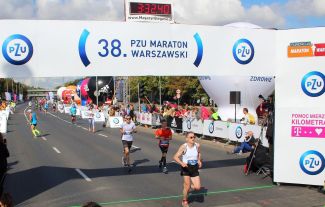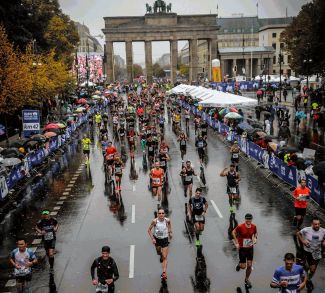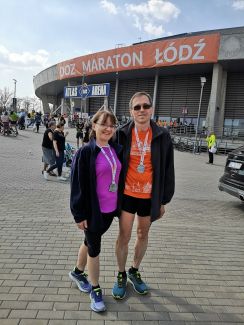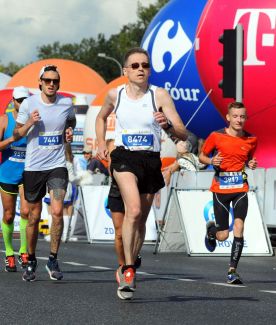In 1996 and 1997-99, he participated in postdoctoral placements at the National Institute of Materials and Chemical Research in Tsukuba (Japan). He also worked at the Radiation Laboratory at the University of Notre Dame (USA) in 2012. In 2020, he was granted a professorship.
Prof. Wojcik's main scientific achievements focus on organic photovoltaic cells and radiation detectors. He is a member of the international research groups DarkSide and The Global Argon Dark Matter Collaboration, which aim to explain the nature of the so-called dark matter. His main non-scientific passion is running. He has completed 8 marathons.
How long have you been running?
I have been running for about 10 years, so I started rather late, being already "just before 50".
Have you done any other sports before? What has encouraged you to run?
I have always liked physical activity, although I was not particularly athletically talented. In my youth, I did mountaineering. I was a member of our Academic Mountain Club. Then family responsibilities came up, more intensive professional work during my internship abroad, and all that made physical activity secondary. I missed it. In addition, like many of us, I began to suffer from "harmful" working conditions - sitting in front of a computer for long periods of time. I took a little interest in swimming and started cycling more, but it was only in running that I found my true passion.
When did you run your first marathon? Do you remember your impressions after crossing the finish line?
I took part in the run "at the royal distance" of 42,195m for the first time in Łódź in April 2015. You don't run that far in training, so the first start is always a big unknown. Like many debutants I started a little too fast and after thirty-odd kilometres my body just said "thank you". That is, it turned out that I was no longer able to force myself to continue running. Fortunately, after a few minutes of walking some strength returned and I managed to somehow reach the finish line. What is there to say? Completing your first marathon is a great joy and satisfaction, probably every runner's dream come true. And I was even satisfied with the time I achieved then (3 hours 53 minutes).
You have already completed 8 marathons. Do you have your own strategy for completing such a long distance?
The most important thing in a marathon is to realistically set the pace. Every minute of time gain in the first half of the distance gives you a few minutes of loss later or even you "hitting the wall", which, as I already mentioned, happened to me in my debut. I don't have any special strategy for the marathon. I try to keep an even pace, I eat 3-4 energy gels during the run. What I care about now is not so much finishing the marathon itself but achieving the best possible time.
Which marathons have you participated in so far? How many kilometres have you already run?
I have completed the Łódź Marathon four times, the Warsaw Marathon twice and the Berlin Marathon twice. The latter is an event of special importance, one of the six called "Majors" (there are also marathons in New York, Boston, Chicago, London and Tokyo). Over 40 thousand participants from all over the world, crowds of fans, and "next to me" Eliud Kipchoge ran, setting the current world record (2:01:39).
As for the total distance I have run so far, it comes to over 17,000 km. Nowadays it is quite easy to get statistics, as most runners use a watch (or phone) with GPS and record their activities on some training portal.
Marathon participants say that it is a great experience, provided that you prepare properly. What does your preparation look like?
I need at least two months of direct preparation for a marathon. I run about 70 km a week then. The most important training element is of course long runs, between 20-30 km, done 1-2 times a week at a slow or marathon pace.
Which distances do you run most often? How long does it take for your endorphins to kick in? What is it like after a few hours of effort?
I run not only marathons but also other popular street running distances, i.e. 5km, 10km and half marathons. I usually run at the maximum of my capabilities, which makes me feel really tired and guarantees a surge of endorphins. In long runs, such as marathons, the most pleasant part is somewhere between 5 and 15 km. Then you run lightly, almost without feeling any effort. You can even enjoy watching the surroundings, especially when you are in another city.
They say that running brings people together. Have you encouraged any of your friends to take up this sport?
Runners do indeed like company and often organise themselves into more or less formal groups, although the sport itself is individual. I think I encouraged my wife Dorota to run to some extent, but she says (jokingly) that she simply had no other choice. Happily, my wife and I now share not only our professional interests (Dorota is also a professor working at the Faculty of Chemistry, TUL), but also our sports interests. We often participate in competitions together. We especially like away events, where, apart from the competition itself, we can also spend time sightseeing. Dorota has already run several half marathons and is now thinking about her marathon debut. What is interesting, she incomparably more often than me comes back from competitions with cups and statuettes for her achievements.
What are your running plans for the coming year? Are you planning to start in marathons?
As we all know, the pandemic has extremely affected the organisation of sporting events and planning future starts is very difficult. In 2020, my wife and I were signed up for the Rotterdam and Chicago marathons. The latter event has been cancelled and the Rotterdam marathon has been moved to this autumn. Maybe we will make it? For now, we try to train regularly and participate in the few local runs that are sometimes still organised or in so-called virtual runs. Fortunately, it is now permitted to run normally in parks or forests, and the absurd bans of last spring are hopefully no longer under consideration.
Why is it worth having a passion in life?
Because life then is more interesting, fuller, more enjoyable. My running is a great complement to my professional passions. It gives me a sense of relaxation, improves my mood and sometimes allows me to get away from everyday life.
Running is a special sport. You can run practically in any area and at any time of the year. No expensive investments are necessary. Running trainings do not take much time and they can be included in almost every day schedule. It is true that your body has to get used to the new strain gradually and there are usually harmless injuries, but the progress in building up your fitness is very fast and the beneficial effects for your health and well-being appear almost immediately. And it is addictive.
Interviewed by Małgorzata Trocha




